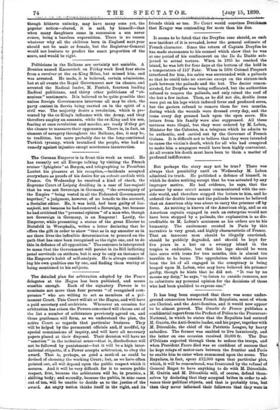But perhaps the story may not be time P There
was always that possibility until on Wednesday M. Lebon admitted its truth. He published a defence of himself, in which he denies nothing except that he was actuated by any improper motive. He had evidence, he says, that the prisoner by some occult means communicated with the out- side world, and therefore stopped the letters to him, and he ordered the double irons and the palisade because he believed that an American ship was about to carry the prisoner off by force. As nothing is known of the American ship, and as an American captain engaged in such an enterprise would not have been stopped by a palisade, the explanation is as dis- creditable to M. Lebon's acuteness as his orders are to his humanity. The excitement created in Paris by this narrative is very great, and highly characteristic of France. That an innocent man should be illegally convicted, should be publicly degraded, and should be kept for five years in a hut on a swampy island in the tropics is endurable, but that his legs should be worn into sores with irons for two months, this is almost too horrible to be borne. The opprobrium which should have been the lot of all engaged in the conspiracy is being heaped upon M. Lebon, who may have believed his prisoner guilty, though he hints that he did not. "It was by no means my duty," he says, "to listen to outside rumours, nor to substitute my personal opinion for the decisions of those who had been qualified to express one."






































 Previous page
Previous page